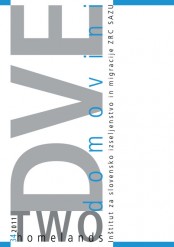Narrating Belonging in the Post-Yugoslav Context
Keywords:
identity, hybrid identity, migrant belonging, narration, former YugoslaviaAbstract
The article questions the validity of the notion of multiple or shifting migrant identities. I argue that such usages of identity in some transnationalism and migration regime studies and in policymaking may serve to label migrants as different. What is ignored by such accounts is that belonging is not freefloating but is situated and contextually bounded, while making “positive” identitary claims may mask the actual structural inequalities. Alternative conceptualizations are explored in which I use the concept of narration and storytelling that better describes migrants’ contextualized realities. The theoretical argument is coupled with empirical research in which various types of belonging in the post-Yugoslav context are explored using biographical interviews with migrants who live in Slovenia.
Downloads
References
Anderson, Benedict (1983). Imagined Communities. London: Verso.
Anthias, Floya (2001). New Hybridities, Old Concepts: The Limits of ‘Culture’. Ethnic and Racial Studies 24(4): 619-641.
Anthias, Floya (2002). Where do I belong? Narrating Collective Identity and Translocational Positionality. Ethnicities 2(4): 491-514.
Arendt, Hannah (1967). Vita activa oder Vom tätigen Leben. München: R. Piper & Co. Verlag.
Balibar, Étienne (2004). We, the People of Europe? Refl ections on Transnational Citizenship. Princeton and Oxford: Princeton University Press.
Barth, Fredrik (1969). Ethnic Groups and Boundaries. New York: Little, Brown.
Bauböck, Rainer (1994). Transnational Citizenship: Membership and Rights in International Migration. Aldershot: Edward Elgar.
Benton, Gregor and Edmund Terence Gomez (2008). Chinese in Britain, 1800–Present: Economy, Transnationalism and Identity. Houndsmills: Palgrave Macmillan.
Brubaker, Rogers and Frederick Cooper (2000). Beyond “Identity”. Theory and Society 29(1): 1–47.
Butler, Judith (1990). Gender Trouble: Feminism and the Subversion of Identity. New York: Routledge.
Cohen, Abner (1974). Urban Ethnicity. London: Tavistock.
Cukut Krilić, Sanja and Jernej Mlekuž (eds.) (2009). Spol in migracija: izkušnje žensk kot akterk migracij. Ljubljana: Založba ZRC.
Delanty, Gerard, Ruth Wodak and Paul Jones (eds.) (2008). Identity, Belonging and Migration. Liverpool: Liverpool University Press.
Erikson, Erik (1968). Identity: Youth and Crisis. New York: Norton.
Fearon, James (1999). What is Identity (As we now use the Word)?. Available at http://www.stanford. edu/~jfearon/papers/iden1v2.pdf. (3.3.2011).
Foucault, Michael (1972). The Archeology of Knowledge. London: Tavistock.
Hall, Stuart (1990). Cultural Identity and Diaspora. Identity: Community, Culture, Diff erence (ed. J. Rutherford). London: Lawrence & Wishart, 222-237.
Hall, Stuart (1996). Who Needs “Identity”? Questions of Cultural Identities (eds. Stuart Hall and Paul du Gay). London: Sage, 1-17.
Habermas, Jürgen (1981). Theorie des kommunikativen Handelns, Band 1, Handlungsrationalität und gesellschaftliche Rationalisierung. Frankfurt am Main: Suhrkamp Verlag.
Hannerz, Ulf (1996). Transnational Connections: Culture, People, Places. London: Routledge.
Jenkins, Richard (1996). Social identities. London: Routledge.
Kontos, Maria (2011). The Labour Market Integration of Third Country Migrants in Germany and the Impact of Recent Policies: Integration Policy as Policy of Exclusion? Precarious Migrant Labour across Europe (eds. M. Pajnik and G. Campani). Ljubljana: Mirovni inštitut, 15-43.
Lazaridis, Gabriella and Anna Maria Konsta (2011). Plastic Citizenship, (In)securities and Processes of Abjectifi cation: The Case of Albanian Migrant Women in Greece. Security, Insecurity and Migration in Europe (ed. G. Lazaridis). Surrey: Ashgate, 259-285.
Levitt, Peggy (2001). The Transnational Villagers. Berkley: University of California Press.
Lukšič-Hacin, Marina (1999). Enodimenzionalno pojmovanje nacionalne identitete nasproti heterogenosti etnične identitete pri izseljencih. Glasnik Slovenskega etnološkega društva 39: 3/4, 76–82.
Milharčič Hladnik, Mirjam (2007). Avto/biografi čnost narativnosti: metodološko teoretični pristopi v raziskovanju migracijskih izkušenj. Dve domovini 26: 31-46.
Milharčič Hladnik Mirjam and Marina Lukšič-Hacin (2011). Identitete, pripadnosti, identifi kacije. Medkulturni odnosi kot aktivno državljanstvo (eds. Mirjam Milharčič Hladnik, Marina Lukšič-Hacin and Mitja Sardoč. Ljubljana: Založba ZRC, 31-39.
Mishler, Elliot G. (1986). Research Interviewing: Context and Narrative. Cambridge, MA: Harvard University Press.
Mitchell, W. J. T. (ed.) (1980). On Narrative. Chicago: Chicago University Press.
Pajnik, Mojca (2008). Prostitution and Human Traffi cking: Gender, Labour and Migration Aspects. Ljubljana: Mirovni inštitut.
Ong, Aihwa (1999). Flexible Citizenship: On the Logic of Transnationality. Durham, NC: Duke University Press.
O’Neill, P. E. Raf (2006). The European Union and Migration: Security versus Identity? Defence Studies 6(3): 322-350.
Pajnik, Mojca and Veronika Bajt (2009). Biografski narativni intervju: aplikacija na študije migracij. Dve domovini 30: 69-89.
Pajnik, Mojca and Giovanna Campani (eds.) (2011). Precarious Migrant Labour across Europe. Ljubljana: Mirovni inštitut.
Pries, Ludger (ed.) (2001). New Transnational Social Spaces: International Migration and Transnational Companies in the Early Twenty-fi rst Century. London: Routledge.
Somers, Margaret (1994). The Narrative Constitution of Identity: A Relational and Network Approach. Theory and Society 23(5): 605-649.
Yuval-Davis, Nira (2006). Belonging and the Politics of Belonging. Patterns of Prejudice 40(3): 197-214.
Yuval-Davis, Nira (2007). Intersectionality, Citizenship and Contemporary Politics of Belonging. Critical Review of International Social and Political Philosophy 10(4): 561-574.
Downloads
Published
How to Cite
Issue
Section
License

This work is licensed under a Creative Commons Attribution-NonCommercial-NoDerivatives 4.0 International License.
Authors guarantee that the work is their own original creation and does not infringe any statutory or common-law copyright or any proprietary right of any third party. In case of claims by third parties, authors commit their self to defend the interests of the publisher, and shall cover any potential costs.
More in: Submission chapter





